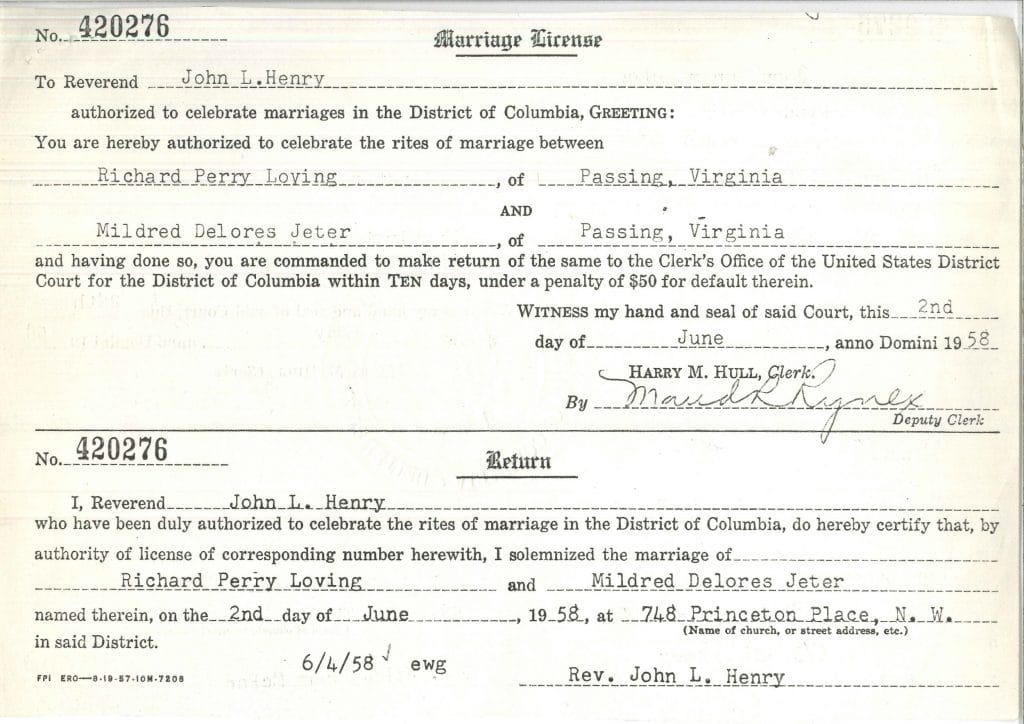Background
On June 2, 1958, high school sweethearts Richard Loving and Mildred Jeter of Virginia drove to Washington, D.C., to marry. A few weeks later, police working from an anonymous tip woke up Mildred and Richard in the middle of the night. The police arrested them for violating Virginia’s miscegenation law. According to this law, no white person could marry someone of another race. Richard was white. Mildred was not.
The judge gave Richard and Mildred a choice. They could go to prison for a year or leave Virginia. They chose to relocate to Washington, D.C. In 1963, frustrated that they were still banned from their home, they sued the state of Virginia. For the next several years, the Lovings and their lawyers battled in court. Eventually, their case made it all the way to the U.S. Supreme Court.
In a unanimous 1967 decision, the Court ruled the Virginia law to be unconstitutional and racist. The ruling struck down not only the Virginia law, but also any other remaining state laws banning interracial marriage. Mildred, Richard, and their children lived happily together in Virginia until Richard’s death in a car accident in 1975. Mildred died in 2008.
About the Image
This resource includes two documents: Mildred and Richard’s marriage license and the warrant for Mildred’s arrest.
The arrest warrant describes Mildred as Black, or negro. But this was not true. Mildred was Native American. Her family was part of the Rappahannock tribe. Records suggest that officials in the 1920s influenced policy such that Indigenous people were codified as Black. In this way, any acknowledgement of Indigenous people was systematically erased in Virginia law. Even Mildred’s lawyers argued the case from a Black vs. white perspective. Later in her life, Mildred gave an interview in which she attempted to correct this point. It is clear that she, like many Americans who did not fit into the racial binary, struggled to define herself in the legal system and in society.
Vocabulary
- miscegenation: Marriage or procreation between people from different racial groups. Note that this is a deeply offensive idea based on incorrect science and theories about race.
- warrant: A document issued by a government official giving police permission to arrest someone.
Discussion Questions
- What do you notice about the marriage license and the arrest warrant?
- Why are these documents important to the story of the Loving v. Virginia case?
- Why did Richard and Mildred marry in Washington, D.C., when they lived in Virginia? Why were they arrested?
- Why is Mildred’s racial identification significant? What does this tell you about race and the law in America?
- Why do you think Mildred and Richard took legal action against the state of Virginia? What does this tell you about their characters?
- Laws banning interracial marriage had existed in many states across the country for decades. Why do you think the Supreme Court ruled in favor of the Lovings in 1967?
Suggested Activities
- Connect this resource to other materials in WAMS, including the life stories of Mamie Till-Mobley, Pauli Murray, and Ella Baker and resources related to the Little Rock Nine and Freedom Summer, to deepen students’ understanding of women’s roles in the civil rights movement.
- Connect this resource to the document on coverture and the article “A Woman without a Country.” Invite students to think about how laws are used to limit not only who women can marry but also their position in society through marriage choices.
- Encourage students to connect the Loving v. Virginia case to more recent arguments about the limitations of marriage, including Obergefell v. Hodges, which legalized same-sex marriage.
- Invite students to learn more about the Loving v. Virginia case by combining these resources with the materials available here.
Themes
AMERICAN IDENTITY AND CITIZENSHIP; ACTIVISM AND SOCIAL CHANGE; DOMESTICITY AND FAMILY








